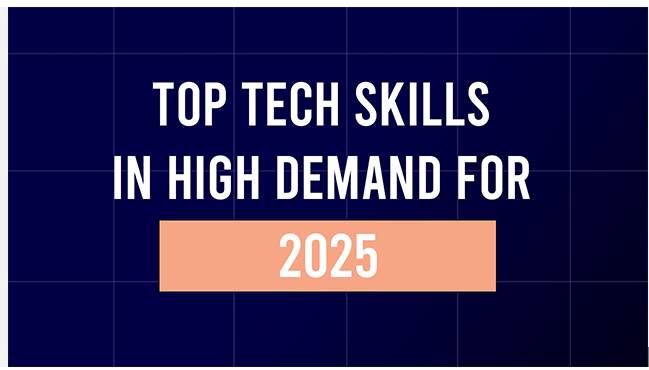As we progress into 2025, the technological landscape continues to evolve at an unprecedented pace. Industries across the globe are increasingly relying on advanced technologies to drive innovation, enhance efficiency, and maintain competitiveness. For professionals aiming to stay ahead in this dynamic environment, acquiring proficiency in certain tech skills is paramount. Here’s a comprehensive overview of the most sought-after technical competencies in 2025:
1. Artificial Intelligence (AI) & Machine Learning (ML)
AI and ML are no longer just buzzwords; they are integral to modern technological advancements. From automating routine tasks to enabling predictive analytics, these technologies are transforming industries such as healthcare, finance, and retail.
Key Areas to Focus:
-
Natural Language Processing (NLP)
-
Deep Learning
-
AI Ethics and Responsible AI
-
AI Deployment and Integration
Recommended Tools & Languages:
-
TensorFlow, PyTorch
-
Python, R
-
OpenAI APIs
2. Cybersecurity
With the increasing frequency and sophistication of cyber threats, cybersecurity remains a critical priority for organizations worldwide. Protecting sensitive data and ensuring the integrity of systems are paramount.
Essential Skills:
-
Ethical Hacking and Penetration Testing
-
Risk Management and Incident Response
-
Zero-Trust Architecture
-
Security Compliance and Cryptography
Certifications to Consider:
-
CISSP (Certified Information Systems Security Professional)
-
CEH (Certified Ethical Hacker)
-
CISM (Certified Information Security Manager)
3. Cloud Computing & DevOps
The shift towards cloud-based infrastructures and the adoption of DevOps practices are reshaping how organizations deploy and manage applications. Mastery in these areas ensures scalability, reliability, and efficiency.
Core Competencies:
-
Cloud Platforms: AWS, Microsoft Azure, Google Cloud
-
Infrastructure as Code (IaC) with tools like Terraform
-
Containerization: Docker, Kubernetes
-
Continuous Integration/Continuous Deployment (CI/CD) Pipelines
4. Data Science & Analytics
Data-driven decision-making is at the heart of modern business strategies. Professionals skilled in extracting actionable insights from vast datasets are in high demand.
Key Skills:
-
Statistical Modeling and Data Analysis
-
Data Visualization using Tableau, Power BI
-
Big Data Technologies
-
SQL, Python, R
5. Blockchain Technology
Beyond cryptocurrencies, blockchain offers solutions for secure transactions, transparent supply chains, and decentralized applications.
Areas to Explore:
-
Smart Contract Development
-
Decentralized Finance (DeFi)
-
Supply Chain Management Solutions
-
Platforms: Ethereum, Hyperledger
6. Extended Reality (XR): AR & VR
Augmented Reality (AR) and Virtual Reality (VR) are revolutionizing sectors like education, training, and entertainment by providing immersive experiences.
Skills to Develop:
-
3D Modeling and Animation
-
User Experience (UX) Design for Immersive Environments
-
Familiarity with AR/VR Development Platforms: Unity, Unreal Engine
7. Prompt Engineering
As generative AI tools become ubiquitous, the ability to craft effective prompts to elicit desired outputs is emerging as a valuable skill.
Focus Areas:
-
Understanding AI Model Behaviors
-
Crafting Clear and Concise Prompts
-
Evaluating and Refining AI Responses
8. Full-Stack Development
A comprehensive understanding of both front-end and back-end development enables professionals to build and maintain complete web applications.
Technologies to Learn:
-
Front-End: HTML, CSS, JavaScript, React
-
Back-End: Node.js, Python, SQL
-
Frameworks: Django, Express.js
9. Product Management in Tech
Bridging the gap between technical teams and business objectives, product managers play a crucial role in delivering successful tech products.
Key Responsibilities:
-
Defining Product Vision and Strategy
-
Agile Methodologies and Scrum Practices
-
Cross-Functional Team Collaboration
-
Data-Driven Decision Making
In 2025, the convergence of AI, cloud technologies, cybersecurity, and data analytics is reshaping the tech industry. Professionals who invest in developing these in-demand skills will not only enhance their career prospects but also contribute to the innovative solutions that define the future of technology. Continuous learning and adaptability remain essential in navigating this ever-evolving landscape.

